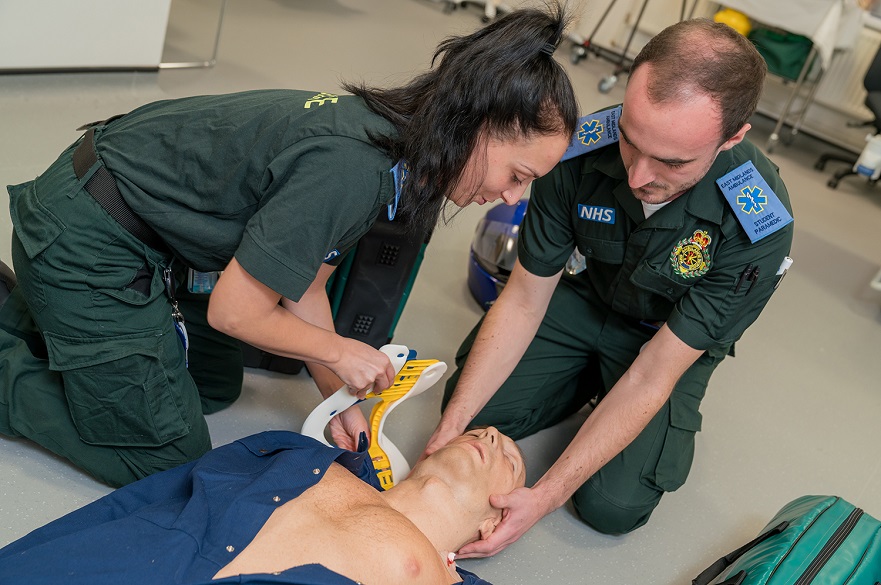Students to learn from emergency simulations on new Paramedic Science courses
Lifelike patient manikins and simulated emergency situations are to form the basis of new Paramedic Science courses at Nottingham Trent University (NTU), including a graduate route and an apprenticeship.
By Helen Breese | Published on 17 December 2019
Categories: Press office; School of Social Sciences;

The courses will be taught in a purposely renovated facility, which features hospital beds, clinical areas and a consulting room. Lifecast Body Simulation manikins – designed and produced at Elstree Film Studios in London – will give students experience of working with men, women and children with a variety of injuries, and in a range of settings.
The clinical skills areas are equipped with cameras to allow students to watch their peers and lecturers tackle simulations while observing, asking questions and giving feedback. The simulation, observations and voices of the manikins are controlled via iPads, allowing tutors to change the situation to reflect an ever-changing, real-life medical emergency.
As well as offering a BSc (Hons) Paramedic Science degree, NTU’s School of Social Sciences has also launched a graduate entry route for people with health-related degrees – the MSc Paramedic Science. Both courses include compulsory practice placements within the ambulance service.
Andrew Kirke, Principal Lecturer in Paramedic, Urgent & Emergency Care at NTU, said: “These courses will prepare students to enter a modern, highly-skilled, integrated workforce. The demands of the profession mean that Paramedics must work across traditional boundaries, and we’ll be bringing in areas like law, policing and social work to ensure they have the knowledge and skillset needed for this challenging and fast-paced career.”
Notes for Editors
Press enquiries please contact Helen Breese, Public Relations Manager, on telephone +44 (0)115 848 8751, or via email.
About Nottingham Trent University
Nottingham Trent University (NTU) was named University of the Year 2019 in the Guardian University Awards. The award was based on performance and improvement in the Guardian University Guide, retention of students from low-participation areas and attainment of BME students. NTU was also the Times Higher Education University of the Year 2017, and The Times and Sunday Times Modern University of the Year 2018. These awards recognise NTU for its high levels of student satisfaction, its quality of teaching, its engagement with employers, and its overall student experience.
The university has been rated Gold in the Government’s Teaching Excellence Framework – the highest ranking available.
It is one of the largest UK universities. With nearly 32,000 students and more than 4,000 staff located across four campuses, the University contributes £900m to the UK economy every year. With an international student population of more than 3,000 from around 100 countries, the University prides itself on its global outlook
The university is passionate about creating opportunities and its extensive outreach programme is designed to enable NTU to be a vehicle for social mobility. NTU is among the UK’s top five recruiters of students from disadvantaged backgrounds and was awarded University of the Year in the UK Social Mobility Awards 2019. A total of 82% of its graduates go on to graduate entry employment or graduate entry education or training within six months of leaving. Student satisfaction is high: NTU achieved an 87% satisfaction score in the 2019 National Student Survey.
A total of 82% of its graduates go on to graduate entry employment or graduate entry education or training within six months of leaving. Student satisfaction is high: NTU achieved an 87% satisfaction score in the 2019 National Student Survey.
NTU is also one of the UK’s most environmentally friendly universities, containing some of the sector’s most inspiring and efficient award-winning buildings.
NTU is home to world-class research, and won The Queen’s Anniversary Prize in 2015 – the highest national honour for a UK university. It recognised the University’s pioneering projects to improve weapons and explosives detection in luggage; enable safer production of powdered infant formula; and combat food fraud.